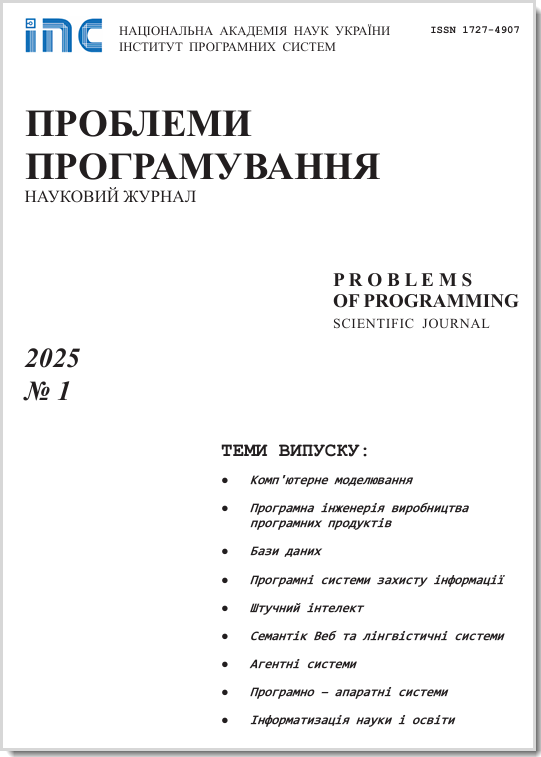Decision support system for quality management in study process
Abstract
The authors describe the design of a decision support system, which allows automating the works on extracting information from the survey results. The generalization of modern publications had confirmed the relevance of the primary purpose of the paper. The domain analysis determined what tasks the decision support system should solve. The results of domain analysis became the base for the requirements specification. Logical and process views represent the system architecture design. A denormalized data structure, which accelerates the acquisition of aggregated data in different dimensions, is developed. The system design provides the work with various data sources as well as incremental development of the decision support system.
Problems in programming 2020; 2-3: 218-227
Keywords
Full Text:
PDF (Українська)References
Microsoft (2017) Education Analytics white paper. [Online] March 2017. Available from: http://edudownloads.azureedge.net/msdownloads/MicrosoftEducationAnalytics.pdf (Accessed: 19th January 2020)
Barranco A.L., Saucedo-Lozada S.N., Avendaño-Jimenez I.Y, Martínez-Leyva R. & Carcaño-Rivera L.A. (2015) Business Intelligence in Educational Institutions. Research in Computing Science. 96. P. 43-53. CrossRef
Soares L., Patricia S. & Lindsay W. (2016) Evolving Higher Education Business Models: Leading with Data to Deliver Results. Washington, DC: American Council on Education.
Guster D. & Brown C.G. (2012) The application of business intelligence to higher education: technical and managerial perspectives. Journal of Information Technology Management. XXIII (2). P. 42-62.
Mussa M.S., Souza S.C., Freire E.F.S., Cordeiro R.G. & Hora H.R.M. (2018) Business intelligence in education: an application of Pentaho software. Revista Produção e Desenvolvimento. 4 (3). P. 29-41. CrossRef
Almeida de M.V., Ferreira J.J.M. & Ferreira F.A.F. (2019) Developing a multi-criteria decision support system for evaluating knowledge transfer by higher education institutions. Knowledge Management Research & Practice. 17 (4). P. 358-372. CrossRef
Hesham F. & Riadh H. (2020) How can one improve the logistics process of academic orientation? Neural network programming
to support the decision-making system in a university career. International Journal of Advanced and Applied Sciences. 7(1). P. 6-19. CrossRef
Sanzana M.B., Garrido S.S. & Poblete C.M. (2015) Profiles of Chilean students according to academic performance in mathematics: An exploratory study using classification trees and random forests. Studies in Educational Evaluation. 44. P. 50-59. CrossRef
Carneiro J., Saraiva P. & Martinho D. (2018) Representing decision-makers using styles of behavior: An approach designed for group decision support systems. Cognitive Systems Research. 47. P. 109-132. CrossRef
Burstein F. and Holsapple C. (eds.) (2008) Handbook on Decision Support Systems 1. Basic Themes. Berlin Heidelberg:Springer-Verlag. CrossRef
Krisilov V.A. & Komleva N.O. (2019) Analysis and Evaluation of Competence of Information Sources in Problems of Intellectual Data Processing. Problemele Energeticii Regionale. 1-1 (40). P. 91-104.
Bass L., Clements P. & Kazman R. (2012) Software Architecture in Practice. Addison-Wesley Professional.
Richards M. (2015) Software Architecture Patterns. O'Reilly Media, Inc.
Liubchenko V. (2019) Queueing Modelling in the Course in Software Architecture Design. Advances in Intelligent Systems and Computing III. 871. P. 550-560. CrossRef
Kungurtsev А.B. & Zinovatnaya S.L. (2008) Simulation model for research of denormalization efficiency of relational database in the information system. Scientific journal "Radio Electronics, Computer Science, Control". 1(19). P. 60-69. (in Russian).
DOI: https://doi.org/10.15407/pp2020.02-03.218
Refbacks
- There are currently no refbacks.



